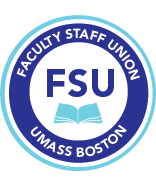The Point: Identity Politics
5/1/2025
This week’s Point was written by Jeff Melnick, former FSU VP and Professor of American Studies
I am going to ask your indulgence for a minute and tell you a little something about my own scholarly work. For the past few years I have been researching and writing a book on Boston’s various music scenes (and race and youth culture and technology and…) in the modern era. I start the study in 1974 for a number of reasons, including that this was the year school desegregation went into effect in Boston, it was the year the Combat Zone was officially organized as Boston’s vice district, it was the year that our own UMB was founded on Columbia Point, and much more.
It was also the year that a group of Black feminists who would come to call themselves the Combahee River Collective, would begin meeting together in Dorchester, just a few miles from our campus, in the living room of one member. This group would issue a manifesto a few years later, a crucially important document that among other things introduced the concept of “identity politics” into scholarly and activist speech: “We believe that the most profound and potentially most radical politics come directly out of our own identity.” The concept of identity politics is under multifront attack in our moment, but I want us to think about how, in this fraught moment, we can commit as a union to our identities as teachers, archivists, scholars, and librarians.
These concerns with regard to identity have been on my mind plenty in recent days, most sharply the other day when I read this account of a report on antisemitism and Islamophobia at Harvard--one more pathetic articulation of Harvard’s capitulation to the forces of reaction that have been buzzing opportunistically around that campus. There are two particularly worrisome things I noticed in this New York Times account. First is the utterly scurrilous and dangerous claim that the most “partisan and politicized” courses at Harvard having do with Palestine and Israel on are “disproportionately taught by nontenure track faculty members, who were not as carefully vetted as more senior faculty are.” I know we need to stop paraphrasing that Niemöller “first they came for” poem—it’s starting to lose its sharpness at this point—but damn if this isn’t a “first they came for” moment! We must resist this kind of divide and conquer tactic at every turn.
My eye was also caught by a quotation in the article from Roni Brunn, identified as a spokeswoman for the Harvard Jewish Alumni Alliance, who noted approvingly that the “university had called out what she saw as ‘academically unsound’ ideas that undergird antisemitic views, like the concept of settler colonialism.” It is fascinating to compare the two reports issued by Harvard—one on anti-Arab, Palestinian, and Muslim bias on campus and one on Antisemitism and Anti-Israel bias. Only the latter mentions “settler colonialism”—and if my ctrl-F is working correctly, something like 30 times at that.
Our colleague Professor Meredith Reiches recently wrote an important and clarifying Point on the weaponizing of antisemitism particularly with respect to matters of personal safety and security. As a friendly amendment I want to encourage us all to think about our identities as members of the FSU—guardians of the most crucial matters of teaching and research at UMB—in this context. The anti-racism grants the FSU has administered are a good start, but we all need to think about ways to make sure that our classrooms, labs, and individual research projects remain safe from politicized attacks and are supported with the resources we need to carry out our collective project.
I regularly teach about “settler colonialism”—especially in my graduate classes. This is a central, long-established analytic used in my interdiscipline of American Studies. So let me end this week’s Point with an endorsement of two books my students have found particularly useful in explaining and applying the concept. The first is Professor Kelly Lytle Hernández’s City of Inmates: Conquest, Rebellion, and the Rise of Human Caging in Los Angeles, 1771-1965; in the introduction, the author offers up a particularly cogent explanation of the difference between other forms of colonialism, where the emphasis is resource extraction and labor exploitation, and settler colonialism, which is organized around land theft and permanent dispossession of racialized outsiders. Similarly useful is Professor Walter Johnson’s The Broken Heart of America: St. Louis and the Violent History of the United States, which explores that city’s past and present as a locus of imperial domination and white supremacy.
I understand how and why the concept of “identity politics” has been discredited in our time—mostly it is the result of a very bad faith set of efforts by reactionary propagandists looking to roll back decades of civil rights’ gains. So, thinking back to 1974 and the founding of the Combahee River Collective, I want to urge all of us to stay invested in the idea that our identities as FSU members means we must stay vigilant about protecting the legitimacy of our core mission as teachers, archivists, librarians, and scholars.
As always, let us know how this is all playing out in your classrooms, labs, and/or in your own research protocols. You can always reach us at fsu@umb.edu.
